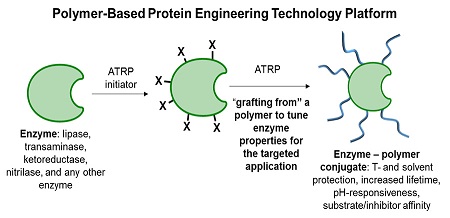
Two Carnegie Mellon University (CMU) faculty members are changing the way that proteins are made for industry through their startup BioHybrid Solutions. McGowan Institute for Regenerative Medicine affiliated faculty member Krzysztof Matyjaszewski, PhD, is the J.C. Warner University Professor of Natural Sciences in the Department of Chemistry, and Alan Russell, PhD, is the Highmark Distinguished Career Professor of Chemical Engineering and former Director of the McGowan Institute.
Both faculty members have been recognized recently for their work and research. Dr. Matyjaszewski recently was elected into the National Academy of Sciences, and as CEO of BioHybrid Solutions, Dr. Russell received the 2018 Innovator Award from the Pittsburgh Business Times. A third co-founder, Antonina Simakova, PhD, is a postdoctoral researcher in the Matyjaszewski Polymer Group. Prior to receiving her doctorate at Carnegie Mellon, she was named a 2016 Innovation Fellow by the Swartz Center for Entrepreneurship.
BioHybrid was created in 2016 to produce protein-based products for a range of industrial applications. Their process uses atom transfer radical polymerization (ATRP), which was first discovered by Dr. Matyjaszewski in 1995.
Proteins can be used to create injectable therapeutic treatments such as insulin and for catalyzing reactions in pharmaceutical and biofuel manufacturing. However, these proteins are required to function in environments that may hinder or prevent them from working in the desired way – insulin, for example, must be injected because it otherwise cannot survive the acidity of the stomach.
To protect protein in these hazardous environments, BioHybrid “nano-armors” proteins with polymer chains, attached via the ATRP process. Though the ability to create protein-polymer conjugates like this has existed for a long time, prior to now the process has been expensive, time-consuming and difficult to control. With Drs. Matyjaszewski and Russell’s methods, the same products can be produced faster and with a much higher degree of control – at just one-tenth the cost.
“We are using techniques and catalysts that are billions of times more active than those originally used 20 years ago, allowing us to use much smaller concentrations,” Dr. Matyjaszewski said. “Especially in an aqueous system, you need to tweak the polymerization conditions a little bit-like cooking, but cooking by design. It’s more like molecular cuisine.”
BioHybrid has secured funding from the U.S. Department of Energy (DOE) and the National Science Foundation (NSF), with plans to continue to grow and expand its business. It was among the 2016 NSF I-Corps teams at CMU. I-Corps, which was created by the National Science Foundation in 2011, provides funding for scientists and engineers to extend their focus beyond the laboratory in order to broaden the impact of select NSF-funded basic-research projects.
Illustration: Carnegie Mellon University.
Read more…
